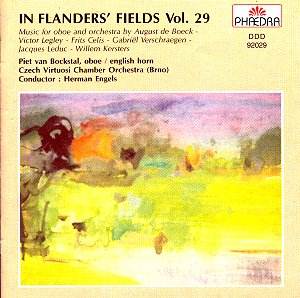August de Boeck was one of the first Belgian composers of any
significance in the late 19th and early 20th centuries,
and is probably best-known for his fine Symphony in G which
has been regularly recorded (it is available on MARCO POLO 8.223740).
His simple Romantic music, often tinged by some superficial Impressionism,
is represented here by his delightful, pastoral Fantasy,
a comparatively late work completed as late as 1926.
Victor Legley achieved some considerable reputation
with his powerfully impressive orchestral work De Stalen Kathedraal
Op.52 of 1958 which displays some rugged energy, somewhat in
the same way as Blomdahl’s Forma Ferritonans. He composed
consistently throughout his long career, and his sizeable and varied
output includes several considerable symphonies, a good deal of chamber
music (including several string quartets) and a handful of fine concertos
(his Viola Concerto Op.78 of 1971 is one of his finest
whereas his Second Violin Concerto Op.67 was commissioned
as the test piece for the finals of the Queen Elizabeth Competition
in 1967) of which the Oboe Concertino Op.100 completed
in 1982. It is a somewhat lighter, mellower work than most of this composer’s
output. It is in four concise, clearly characterised movements of which
the lively dancing Finale is Legley at his sunniest.
For many long years, Frits Célis has been active
as a teacher and as a conductor at the Théâtre de la Monnaie
in Brussels and at the Royal Flemish Opera in Antwerp. Since his resignation,
he devoted his time to composition and his output has since considerably
increased. Kareol Op.61, completed in 1997, was originally
written for cor anglais and piano. The orchestral version heard here
was made by the composer in 2002. Kareol is Tristan’s castle and this
elegiac work obliquely refers to the myth of Tristan and Isolde, and
appropriately includes a brief quotation from Wagner’s opera.
In spite of his many academic activities, Jacques Leduc
composed a sizeable output of orchestral and chamber works characterised
by clarity and economy of means, not unlike Lennox Berkeley’s. His beautiful
Oboe Concertino Op.10 of 1962 is a fine example of Leduc’s
urbane lyricism and impeccable craftsmanship.
Willem Kersters is another noteworthy Belgian composer
with a considerable body of works to his credit. His early Oboe
Concertino Op.2 of 1953 is a very attractive work still in a
fairly traditional idiom, i.e. by 20th Century standards.
(Later, Kersters will develop his own brand of dodecaphony without ever
adhering unconditionally to strict serial techniques.) It is in three
compact movements full of Kersters’s early lyricism, but already displaying
most of this composer’s hallmarks : economy of means, formal mastery,
sureness of touch, to name but a few.
This superb release also includes Verschraegen’s delightful
Three Flemish Dances for oboe and strings that the present
soloist has already recorded once before. Gabriël Verschraegen
was mainly known and appreciated as a brilliant organist, but he did
also compose some music. His Flemish Dances are simple,
colourful miniatures of great charm.
Piet van Bockstal is a fine musician for whom many
Belgian composers have written. He often plays Belgian music, and the
present generous, varied and attractive selection is most welcome, both
for the quality of the music and the quality of the playing. A splendid
introduction to some 20th Century Belgian music that should
not be missed.
Hubert Culot
NOTE
Information concerning PHAEDRA CDs may be obtained
from the following address
Vzw Klassieke Concerten – Phaedra CD
Donkerstraat 51
B-9120 BEVEREN
Belgium
Or by browsing through their website www.phaedracd.com
